 Folk Camps
Folk Camps
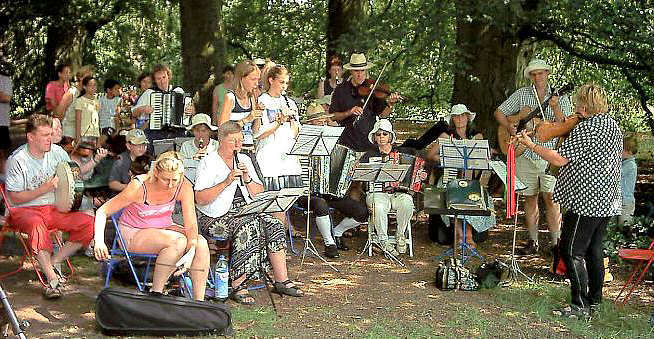
Where can you find Folk Dancing (traditional, ceilidh, rapper, morris, American, Playford, Appalachian clog, English clog), and Folk Singing except at Festivals? There are six week-long Folk Camps happening this year (2017) and nine weekend camps, but I bet a lot of you don't know anything about them. Folk Camps are wonderful !!
Like the Hobby Horse Club and Sidmouth Festival, Folk Camps were started by the legendary Bill Rutter. They were intended as inexpensive holidays for Folk singers and dancers with families, though I've been going for over thirty-five years and still not acquired a family (I now have a wife, but she doesn't camp). They've attracted staff such as John Kirkpatrick, Taffy Thomas, Hugh Rippon, Ken Alexander, Wild Thyme, Dampiers Round, Fiona Maurice-Smith, and many more. The magic is certainly there, and you won't win any friends if you think of it as a cheap imitation of a Festival.
My first experience of Folk Camps was a Youth Camp when I was 27. I phoned up Tony Millington, who was then the organiser, and said, “I'm 27 — am I too old for a Youth Camp?” and he replied “I'm 28 and I'm the warden”. I loved the experience and have been going ever since.
In those days planning legislation allowed only three caravans on the site — presumably they were afraid we were really gipsies — so almost everybody was in tents. Folk Camps Society now holds an exemption certificate regarding planning laws so there are caravans and camper vans as well, but the teenagers often camp together in a circle of miniature tents known as “Mushroom City”.
I had booked to go on a Folk Camp near Portsmouth one year, and at the last moment the venue had to be changed. A farmer had agreed that we could hire one of his fields for two weeks, but the locals found out about it and threatened to boycott his produce unless he cancelled the booking — which he did. A friend of mine happened to live in the area, and she sent me a copy of an article from the local paper, headlined “14 Nights of Barn Dances”. This gave the impression that we were going to be disrupting the calm of the countryside with loud music late at night, taking over their village and so on. It was totally misinformed, but I could see their point of view. Probably the only thing they could imagine was a Pop Festival, and would you want one of those in your village?! I'm pleased to report that we found a much better venue a few miles away.
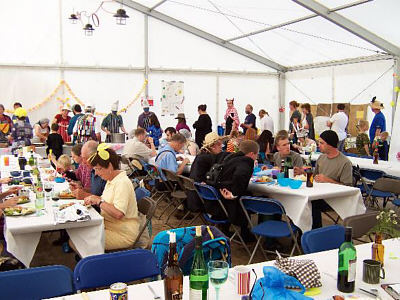
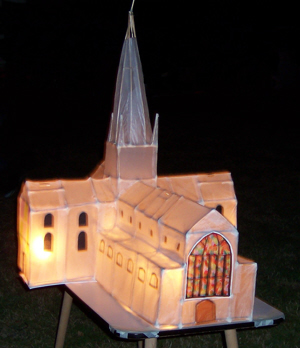
Folk Camps can really bring people out. I remember a very shy man who didn't make friends easily, probably at his first Folk Camp. He set up a live Pac-man game, with walls marked out with tape, items to be picked up by the Pac-man, and ghosts who were slowed down by having to wear one frogman's flipper. The kids loved it, and he was the hit of the camp.
Of course, it's not for everyone. My background is Scout camps and school journeys, and to me it seemed perfectly natural from the start, but I once took a girl-friend whose idea of a holiday was to go away with one person and just do things with them. I leapt in and started joining in with everything, while she retreated and thought “What am I doing here?” — it took a lot of adjustment for both of us. If camping means “roughing it” to you, or you like to keep yourself to yourself, or you don't like children, you'd probably hate it. But many people love the friendliness, the sense of belonging to a community, the chance to join in, ignore or run activities as you wish. On the last night there's a party, often with a fancy dress theme, and these can be amazing! You have to experience it; I just can't convey the atmosphere. I remember one on the theme of The French Revolution where there was a guillotine, so after I had called a dance there was a cry of “To the guillotine with him”, where I was dragged, the blade came down and the executioner held up a (dummy) head to general applause and rejoicing.
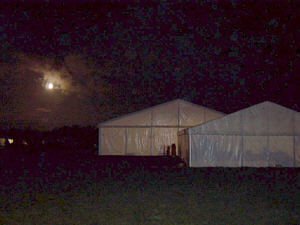

There is also a German Folk Camps organisation at folkcamp.de
The photos are taken from The Unofficial Folk Camps Photo Archive: facebook.com/
Click here to see a video on Facebook of the Folk Camps Party Band at Chippenham Folk Festival in 2018 — and you don't have to sign up to Facebook to watch it!
Halsway Manor
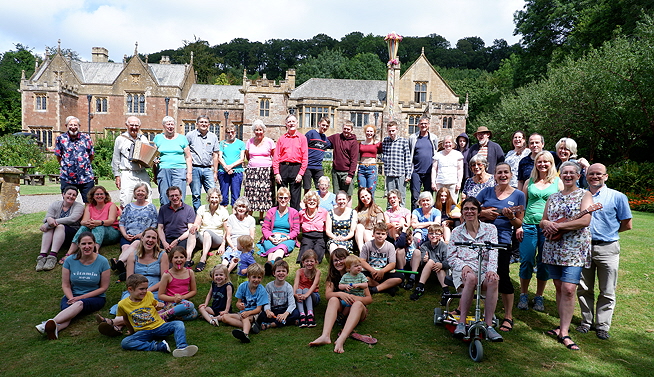
If you like the sound of Folk Camps but don't like camping and/or don't want to do any work, another option is the Family Folk Week at Halsway Manor. This is similar to a Folk Camp in many ways but the meals are provided and you have the option of either camping or staying in one of the rooms at the manor. It's early in August and runs from the Saturday evening with dinner to the Friday morning with breakfast. Above you can see the participants in 2019 — that's me at the back in the red shirt!
October 2021 — Things have changed at Halsway and I withdraw my recommendation. As you can see from Willow's comments below, David Faulkner has persuaded the management at Halsway that anyone who isn't part of a family is a danger to children and shouldn't be allowed in. If Folk Camps had taken that attitude I wouldn't have been going there for nearly fifty years. The band tried to reason with the Halsway Manor trustees, as a result of which the whole team has been sacked. The current web page says “We'll be working with experienced and multi-talented community artists to deliver this week; team details will be added shortly”. This sounds like children's entertainers to me, rather than something for the whole family which it has been until now. I'm very disappointed. By 2025 the Family Folk Week had disappeared from the programme.
On Tuesday, February 3, 2009, Michael Barraclough from Northern Virginia wrote:
One of the few things that I miss about the UK is Folk Camps. There is nothing really like it here in the USA. Although I haven't been to one for many years, I used to go regularly and for a long time was either a warden or leader.
I have many memories from my folk camping days - mowing a dance floor in front of the marquee (big tent) at Llyngwril so that we could have a public outdoor dance to celebrate the wedding of Princess Di and Prince Charles; all the men being out in the pooring rain at Morfa Nefyn, hanging on to the guy ropes during the Fastnet gales; the 20-piece band one night where all those playing were band/local orchestra standard; the camp hike that accidentally went through a nudist area; or, the particularly delectable female taking a late night shower in a tarpaulin shower tent whose outline was illuminated by car headlights.
On Monday, March 2, 2009, Carolyn from Epsom / Loughborough wrote:
Hi Michael, your name sounds familiar to me.
I visited a couple of my old Bangor University friends last summer, Chris and Keith Garbutt. They live in Morgantown, West Virginia. They are into Morris Dancing over there. We went to three festivals, one each weekend. The one I felt most at home at was Pattyfest in Morgantown. That can't be so far away from you in Norther Virginia - so give it a try. I particularly enjoyed a flat-footing workshop and picked it up straight away. Pete who came with me enjoyed playing along with a couple of picking sessions. Failing that suggestion you have only two alternatives: come back to English Folk Camps or organise your own over there.
Linda (was Double), David Bradley (do you remember them?) and I have sucesfully set up a Folk Camp for the Disabled using a special campsite, Woodlarks, in Farnham, Surrey so that some of our friends who wouldn't be a cope at an official FolkCamp with their wheelchairs, etc. nor afford it are not excluded from the joys of playing folk music, dancing and singing and the cameraderie that goes with it.
On Monday, March 2, 2009, Carolyn from Epsom wrote:
Colin,
Your website gives an appropriate feel to what a folk camp is like, well done and thank you.
On Tuesday, May 18, 2010, Steve & Elaine Goldthorpe from Waipu, New Zealand wrote:
Hi there Colin, don't know if you remember us and the 4 kids. We catered for a number of camps and Steve was warden for a couple as well. This meant we could continue coming to folk camps long after the money was gone! We often refer to folk camps over here. The nearest we have is a gael tag in Whangarei. Unfortunately we are involved in Scottish Country Dancing and have committments to the local Waipu highland games at that time. Please pass on our good wishes to all who may remember us,
Cheers, Elaine & Steve
On Wednesday, June 13, 2018, Jochen Riemer from Itzehoe, Germany wrote:
Dear Colin Hume,
Thank You for Your very fine website. It is a great pleasure to read, and I always find something new and interesting.
In Germany we also have a very fine folkcamp with British peoble, dancers and musicians. Perhaps, You will find it attractiv to give the link to the German folkcamp, too, especially in this times.
www.folkcamp.de
Best wishes,
Jochen Riemer
On Wednesday, June 13, 2018, Colin Hume from Letchworth wrote:
Jochen -
Thanks. I have added the link.
On Saturday, September 18, 2021, Willow from Buckinghamshire wrote:
What can I say!! Appalled!!! After attending Halsway family folk week for many years with my sister, meeting wonderful people and becoming friends with all who attend that week, wonderful family because that’s what we became, they bought in a new leader who at the end of the week held a meeting with Halsway management and declared that he didn’t think they should allow people without children as they must have an ulterior motives for being there , in his view we are predators.
How dare Halsway allow this man name David Faulkner to tear apart such a wonderful week with such vile disgraceful comments about wonderful people who have done nothing but give their time love and energy to what was a wonderful week shame on you Halsway shame
